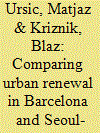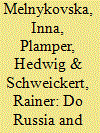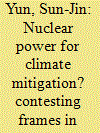|
|
|
Sort Order |
|
|
|
Items / Page
|
|
|
|
|
|
|
| Srl | Item |
| 1 |
ID:
112463


|
|
|
|
|
| Publication |
2012.
|
| Summary/Abstract |
Cities have become increasingly autonomous economic and political actors which actively respond to the pressures and opportunities of globalisation. Consequently, the urban management of any particular city is often based on the assumption that the city can improve its position against rival cities by efficiently managing its strategic resources and promoting its presumed advantages. Though such an approach to urban management may help cities to improve their global competitiveness and the quality of their residents' everyday life, it can sometimes result in negative consequences at the local level, thus actually narrowing the development prospects of the cities in the end. This article discusses urban management against the backdrop of the competitive urban policy in Barcelona and Seoul, and compares the local consequences of urban renewal in both cities. Based on a comparison of the two cases of urban renewal, 22@ Activity District in Barcelona and the Cheonggyecheon restoration in Seoul, this article argues that, in conditions of competition among global cities, even very different approaches to urban management and urban renewal may result in similar consequences at the local level.
|
|
|
|
|
|
|
|
|
|
|
|
|
|
|
|
| 2 |
ID:
112466


|
|
|
|
|
| Publication |
2012.
|
| Summary/Abstract |
The purpose of our paper is to contribute to the literature on autocracy promotion by analyzing Central Asia as the most-likely case, considering both Russia and China as relevant external actors. We develop a concept for our analysis based on the different strategies of Russia and China towards the region and present the results of a qualitative study of the main dimensions of autocracy promotion (regional organizations, economic cooperation, and interference and threat). Based on this qualitative study, we define variables measuring the potential for autocracy promotion and test our hypotheses using panel data for 24 post-communist countries. The somewhat surprising result of our analysis is that, in contrast to Russia's dominance mode of operation, China's doing-business approach towards its neighbors in Central Asia may have-although unintentionally-even positive effects in terms of improving governance and undermining autocratic structures.
|
|
|
|
|
|
|
|
|
|
|
|
|
|
|
|
| 3 |
ID:
112465


|
|
|
|
|
| Publication |
2012.
|
| Summary/Abstract |
Korea has been one of the most aggressive countries pursuing nuclear power expansion, ranking in the top five nations globally for the installation capacity of nuclear power plants, nuclear power generation, and the number of reactors in operation. Even after the Fukushima accident, the Korean government has made no policy changes in regards to nuclear power, and public support for nuclear power remains relatively high. This study focuses on the role of the mass media in representing the Korean government's benefit-oriented nuclear frame and the persistence of public support in the country for nuclear power. The study further aims to answer the following questions: What kind of frame was mobilized by the mass media? What kinds of speakers were chosen by the media to represent a particular side to the issue? A total of three conservative, progressive, and business newspapers were analyzed. The benefits and/or risks of nuclear power in the context of climate change were major topics in the three newspapers. The benefit and risk frame constructed in these three newspapers was characterized as "slightly risky but significantly beneficial" in the conservative Chosun Daily and MK Business and "seemingly beneficial but intrinsically risky" in the progressive Hankyoreh. Different frames were contested in the three newspapers; however, because the influential power of Korean progressive newspapers is weak, arguments supporting the growth and benefits of nuclear power have become pervasive in Korea.
|
|
|
|
|
|
|
|
|
|
|
|
|
|
|
|
| 4 |
ID:
112462


|
|
|
|
|
| Publication |
2012.
|
| Summary/Abstract |
China, Japan, and Korea have begun to engage one another vigorously since the 1997 crisis. As intraregional economic ties have further deepened and broadened, interconnectedness in cultural and political aspects has risen rapidly in a variety of forms. Decision-makers and intellectuals in China, Japan, and Korea have been floating ideas and interests for establishing various types of Northeast Asian community formation. New security dialogues and co-operation frameworks also emerge. Accordingly, the rapidly growing Northeast Asia is likely to emerge as an identifiable regional community. With the incipient emergence of regional community in Northeast Asia, Northeast Asian region-building becomes a salient issue of major academic and policy debates. Yet, in spite of the recent mushrooming of research in and attention to the region-building, the questions regarding within what surrounding and under what situation regional community can be built, as well as what motivates people to choose region-building, and when and how state system can be transformed into a regional community remains only partly resolved. In order to solve this puzzle, this paper will compare the current Northeast Asian region-building with the early stage of European region-building, arguing that while there are important differences in evolution, format, and kind of region-building in Europe and Northeast Asia, critical juncture is influential in region-building.
|
|
|
|
|
|
|
|
|
|
|
|
|
|
|
|
| 5 |
ID:
112464


|
|
|
|
|
| Publication |
2012.
|
| Summary/Abstract |
This paper examines the extent to which the European Union (EU) could be a normative power with the ability to define what passes for normal in a globalized world in its North Korean policy. In contrast with a rationalist view that limits the possibility of engagement and underestimates the implications of the EU's role in promoting North Korea's human rights conditions, constructivist-inspired approaches provide an alternative explanation by arguing that the pursuit of value-oriented policies is constitutive of actors' perceived normative identities. To this end, this paper investigates how humanitarian aid, institutionalized dialogues and multilateral approach are employed to endorse the EU's position as a normative power. In so doing, it also argues how and to what extent these normative operations are affected by its virtue, deontological and consequentialist ethics.
|
|
|
|
|
|
|
|
|
|
|
|
|
|
|
|
|
|
|
|
|